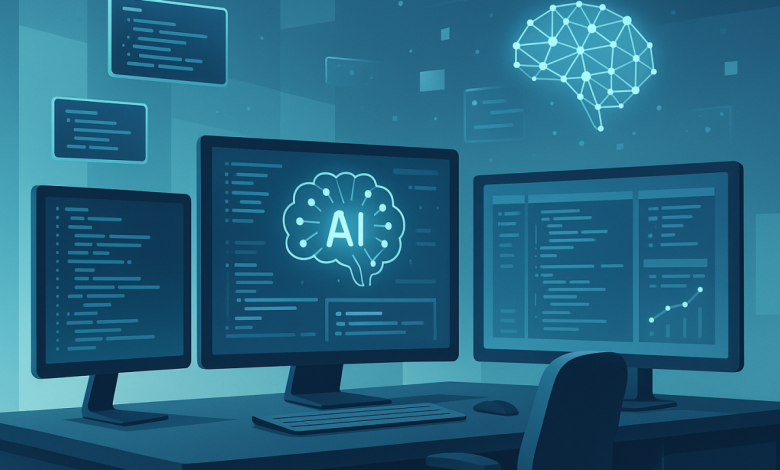The Future of Programming: How AI Will Transform the Developer’s Role

The field of software development has always been in a state of evolution. From the days of assembly language to the rise of object-oriented programming and cloud-based development, each phase has shifted how developers think, work, and create. Now, we are entering a new era where artificial intelligence (AI) is poised to redefine the developer’s role. This article explores how AI will reshape programming, the opportunities it presents, the challenges developers may face, and the skills needed to thrive in the AI-driven future.
1. AI-Powered Coding Assistants
One of the most noticeable changes in programming today is the rise of AI-powered coding assistants. Tools like GitHub Copilot, ChatGPT, and Tabnine can:
- Suggest lines of code in real time.
- Autocomplete functions based on context.
- Help with debugging by analyzing error messages.
- Provide documentation explanations on the spot.
These tools don’t replace developers but enhance productivity. Instead of spending time writing boilerplate code, developers can focus on logic, architecture, and problem-solving.
Example:
A developer building a REST API might only need to describe the endpoint, and an AI assistant can generate most of the function code. This accelerates development cycles and reduces repetitive work.
2. Smarter Debugging and Testing
Debugging and testing are often the most time-consuming parts of software development. AI can transform these processes by:
- Automatically detecting bugs in code before execution.
- Generating test cases that cover edge scenarios.
- Analyzing performance issues in real-time.
This automation allows developers to spend less time fixing errors and more time innovating.
Impact:
AI tools can learn from past errors in a codebase, predict potential issues, and even suggest optimized solutions. This creates more reliable and maintainable applications.
3. Low-Code and No-Code Development
AI-driven platforms are making it possible for non-programmers to build applications using low-code or no-code environments. For developers, this shift doesn’t mean their roles will disappear—it means their responsibilities will change:
- Developers may act more as architects or supervisors of these platforms.
- They may integrate custom logic into no-code apps when complexity is needed.
- They will focus on advanced system design while end-users build simple solutions themselves.
Key Insight:
Instead of coding every feature, developers will increasingly manage ecosystems, integrations, and scalability issues.
4. The Rise of Generative AI in Development
Generative AI models are now able to produce not just snippets of code, but entire applications, UI designs, and even databases. This evolution leads to several new possibilities:
- Rapid prototyping of software ideas.
- Automated generation of UI components.
- Translation of natural language into functional code.
Example:
A product manager could describe a desired mobile app in plain English, and AI could generate a working prototype within minutes. Developers then refine, secure, and scale the solution.
5. The Human Developer’s New Role
With AI taking over repetitive and time-consuming tasks, developers will evolve into higher-level roles that demand creativity, strategy, and oversight. Future developers will need to:
- Focus on system design and architecture.
- Ensure AI-generated code is secure and efficient.
- Collaborate across disciplines (AI ethics, business, cybersecurity).
- Become problem solvers rather than just coders.
6. Ethical and Security Challenges
AI introduces new challenges that developers must be prepared to handle:
- Bias in AI-generated code: AI models may reflect biases present in their training data.
- Security risks: Auto-generated code may contain hidden vulnerabilities.
- Intellectual property concerns: Questions arise about ownership of AI-written code.
Developers of the future will not only need technical skills but also strong ethical and legal awareness.
7. Skills Developers Must Master for the AI Era
To stay relevant in the AI-driven future, developers should focus on acquiring the following skills:
- AI and Machine Learning Fundamentals: Understanding how AI works to use it effectively.
- Data Engineering: Since AI relies on data, handling and structuring data is crucial.
- Cybersecurity Knowledge: Protecting AI systems and AI-generated code.
- Soft Skills: Creativity, communication, and problem-solving will be just as important as coding.
8. Will AI Replace Developers?
A common fear is that AI will replace developers entirely. The truth is more nuanced:
- AI will automate many tasks but not eliminate the role of developers.
- Developers will transition from writing every line of code to orchestrating systems, ensuring quality, and innovating.
- Human creativity, ethics, and strategic thinking remain irreplaceable.
Analogy:
Just as calculators didn’t eliminate mathematicians but enhanced their capabilities, AI will empower developers to achieve more.
9. Future Outlook: A Collaborative Era
The future of programming is not man vs. machine but man with machine. Developers who embrace AI will:
- Build faster and more reliable software.
- Leverage AI as a partner in creativity and problem-solving.
- Shape how technology evolves for society.
Conclusion
AI is undeniably transforming the world of programming, but rather than replacing developers, it is reshaping their role. The future of programming will be defined by collaboration between humans and intelligent systems. Developers who adapt, learn, and embrace this shift will not only remain relevant but will also lead the technological revolution.
The question isn’t “Will AI replace developers?” but rather “How will developers use AI to push the boundaries of what’s possible?”

